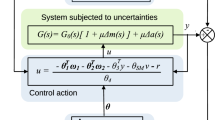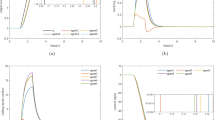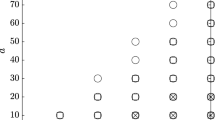Abstract
Finite-model adaptive control problem is studied for a class of discrete-time nonlinear uncertain systems. This problem was motivated by recent efforts on the capability and limitation of feedback mechanism and has the characteristics of “essentially” finite internal uncertainties. To solve this type of problem, based on different ideas, we introduce several approaches, controller falsification, controller combination, and pseudo-parameter estimation, to design the feedback control law and rigorously establish the stability of closed-loop system for several typical algorithms in these approaches. Our results show that, under reasonably weak conditions, capable feedback control laws exist dealing with the finite internal uncertainties of the system. These results together with related results in companion papers provide partial answers to the finite-model adaptive control problem and may lead to deeper understanding on the capability of the whole feedback mechanism.
Similar content being viewed by others
References
Anderson BDO, Brinsmead TS, Liberzon D, Morse AS (2001) Multiple model adaptive control with safe switching. Int J Adapt Control Signal Process 15: 445–470
Angeli D, Mosca E (2004) Adaptive switching supervisory control of nonlinear systems with no prior knowledge of noise bounded. Automatica 40: 449–457
Annaswamy AM, Skantze FP, Loh AP (1998) Adaptive control of continuous time systems with convex/concave parametrization. Automatica 34: 33–49
Boskovic JD (1998) Adaptive control of a class of nonlinearly parametrized plants. IEEE Trans Automat Control 43: 930–934
Campi MC, Kumar PR (1998) Adaptive linear quadratic gaussian control: the cost-biased approach revisited. SIAM J Control Optim 36(6): 1890–1907
Fu M, Barmish BR (1986) Adaptive stabilization of linear systems via switching control. IEEE Trans Automat Control 31(12): 1097–1103
Guo L (1990) On adaptive stabilization of time-varying stochastic systems. SIAM J Control Optim 28(6): 1432–1451
Guo L (1993) Time-varing stochastic systems. Ji Lin Science and Technology Press, Changchun (in Chinese)
Guo L (1997) On critical stability of discrete-time adaptive nonlinear control. IEEE Trans Automat Control 42(11): 1488–1499
Guo L (2002) Exploring the capability and limits of the feedback mechanism. In: Proceedings of ICM2002, Beijing (invited lecture)
Hespanha JP, Liberzon D, Morse AS, Anderson BDO, Brinsmead TS, Bruyne FD (2001) Multiple model adaptive control, Part 2: Switching. Int J Robust Nonlinear Control 11(5): 479–496
Hespanha JP, Liberzon D, Morse AS (2002) Supervision of integral-input-to-state stabilizing controllers. Automatica 38(8): 1327–1335
Hespanha JP, Liberzon D, Morse AS (2003) Hysteresis-based switching algorithms for supervisory control of uncertain systems. Automatica 39(2): 263–272
Hespanha JP, Liberzon D, Morse AS (2003b) Overcoming the limitations of adaptive control by means of logic-based switching. Syst Control Lett 49: 49–65
Li CY, Xie LL, Guo L (2005) Robust stability of discrete-time adaptive nonlinear control. In: Proceedings of the 16th IFAC World Congress, Prague
Ma H (2006) Finite-model adaptive control using LS-like algorithm. Int J Adapt Control Signal Process 21(5):391–414. doi:10.1002/acs.928
Ma H (2007) Finite-model adaptive control using WLS-like algorithm. Automatica 43(4):677–684. doi:10.1016/j.automatica.2006.10.017
Ma H (2008) Further results on limitations to the capability of feedback. Int J Control 81(1):21–42. http://www.informaworld.com, doi:10.1080/00207170701218333
Ma H, Guo L (2005) An “impossibility” theorem on second-order discrete-time nonlinear control systems. In: Proceedings of the 24th Chinese control conference, South China University of Technology Press, Guangzhou, pp 57–61
Morse AS (1996) Supervisory control of families of linear set-point controllers—Part I: exact matching. IEEE Trans Automat Control 41(10): 1413–1431
Morse AS, Mayne DQ, Goodwin GC (1992) Applications of hysteresis switching in parameter adaptive control. IEEE Trans Automat Control 37(9): 1343–1354
Mosca E, Agnoloni T (2002) Switching supervisory control based on controller falsification and closed-loop performance inference. J Process Control 12: 457–466
Safonov MG, Cabral B (2001) Fitting controllers to data. Syst Control Lett 43(4): 299–308
Safonov MG, Tsao TC (1997) The unified control concept and learning. IEEE Trans Automat Control 42(6): 843–847
Skantze FP, Kojic A, Loh AP, Annaswamy AM (2000) Adaptive estimation of discrete-time systems with nonlinear parameterization. Automatica 36: 1879–1887
Stefanovic M, Wang R, Safonov MG (2004) Stability and convergence in adaptive systems. In: Proceedings of American control conference, Boston, MA
Xie LL, Guo L (1999a) Fundamental limitations of discrete-time adaptive nonlinear control. IEEE Trans Automat Control 44(9): 1777–1782
Xie LL, Guo L (1999b) Limitations and capabilities of feedback for controlling uncertain systems. In: Chen S(eds) Control of distributed parameter and stochastic systems. Kluwer, Boston
Xie LL, Guo L (2000) How much uncertainty can be dealt with by feedback. IEEE Trans Automat Control 45(12): 2203–2217
Xue F, Guo L (2001) Necessary and sufficient conditions for adaptive stabilizability of jump linear systems. Commun Inf Syst 1(2): 205–224
Xue F, Huang MY, Guo L (2001) Towards understanding the capability of adaptation for time-varying systems. Automatica 37: 1551–1560
Zhang YX, Guo L (2002) A limit to the capability of feedback. IEEE Trans Automat Control 47(4): 687–692
Author information
Authors and Affiliations
Corresponding author
Additional information
This work was done in Institute of Systems Science, Academy of Mathematics and Systems Science, Chinese Academy of Sciences, Beijing, 100080; Graduate School of the Chinese Academy of Sciences, Beijing, 100080.
Rights and permissions
About this article
Cite this article
Ma, H. Several algorithms for finite-model adaptive control. Math. Control Signals Syst. 20, 271–303 (2008). https://doi.org/10.1007/s00498-008-0029-9
Received:
Accepted:
Published:
Issue Date:
DOI: https://doi.org/10.1007/s00498-008-0029-9




